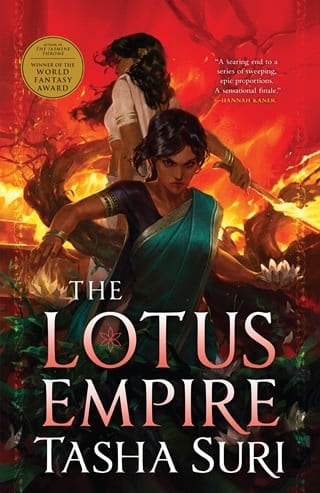Chapter 31 Malini
MALINI
On the journey to Srugna, Malini saw forests and fields rich with rot. Despite the work of her army, the rot was spreading.
One of her guards claimed that at night, in the wind, the trees sang, like their branches were strung through with the cords and sinew of human throats. Malini stayed up one night until dawn and heard nothing, not even the natural groan of trees, and was glad.
Sahar taught her a new game involving dice, and two other guardswomen—Sanvi and Shri—helped Malini practice with her saber, and later with a bow.
Her strength grew.
There were nights when she did not dream of Priya, but there were more nights when she did. Priya haloed by flames; Priya lying on marble carved by rivulets of ever-running water. When she woke she felt a sure knowledge in her bones: They were drawing closer to one another.
Lord Prakash had a haveli on the edge of Srugna and offered his land up as a resting stop for Malini’s army. Malini was grateful for the respite. She was lucky her tent was comfortable and her maid Swati attentive, but traveling day in and day out was exhausting, and even within a perimeter of armed soldiers and her chosen personal guard, she could not avoid the realities of the strain that Parijatdvipa was under. Blasted, empty fields and abandoned villages met them at every turn, and every day they seemed to have to change their path toward Srugna in order to avoid a new outcropping of rot.
As her army settled outside the haveli, within it she and Prakash, Narayan, and Ashutosh shared a carafe of wine. They spoke of lighter topics than usual, and Malini had just managed to cajole Narayan into a game of catur when a Srugani military official interrupted, apologizing and genuflecting even as he leaned over Prakash and whispered a message into his ear.
“There have been fires sighted in a neighboring village,” said Lord Prakash, after the official had scurried out. “If you will excuse me, Empress—I wish to discover the cause.”
“Of course, Lord Prakash,” she said, rising to her feet a second behind him. “Allow me to join you.”
“I am sure this is beneath your notice,” he said gently. “Please remain here. Rest.”
“No emperor worth his salt turned his back from battle,” she said, offering him a firm, thin-lipped smile. “I am no less than my forefathers. I will come.”
The heat in the village was blazing. The size of the fire was vast, golden on the horizon.
When they drew closer, Malini realized it was a large pyre. Her skin instantly grew clammy. She gripped the edge of her chariot.
On the ground, there were warriors corralling a group of people. There were too many people for them to be simply residents of this village—and every one of them was in some way riven with rot. There was someone—a lord, from the look of him—yelling orders at the warriors. Prakash set eyes on him and jumped from his chariot with astonishing nimbleness for a man of his years. By the time Malini had more elegantly alighted, they were deep into an argument.
She took a moment to study the face of this new lord.
She knew it. Once, this lord had been insolent to her. Rohit , she thought. Now, as he stood before her sweating, the firelight reflecting on his face, she could feel nothing but disgust for him.
She should have dealt with him sooner. Her instinct for vengeance hadn’t failed her yet.
“… killing innocents,” Prakash was saying, furious. “What were you thinking?”
“They were not innocents,” Lord Rohit said hotly. “They’re rot-riven. They were attempting to steal food. We do a service burning them.”
Malini took a step closer. Her guards flanked her and barked, “Is this how you welcome your empress?”
A startled silence. Finally, Lord Rohit bowed.
“Empress,” he said. “I did not know you were in Srugna.”
“Clearly,” she said. “You claim these people are criminals, Lord Rohit?”
“The rot turns people into traitors, Empress.”
“And yet there are people in my army who are rot-riven,” she said coolly. “You called them thieves.”
“They have no place in our villages, Empress,” he said. “They have no right to eat our food.” He straightened, squaring his shoulders. “You ordered it so,” he continued. “ No rot-riven near our grain. That was your edict, was it not? My soldiers are doing what is expected of them.”
That was not what she had ordered, when she had commanded each city-state to protect its harvests from the rot. She had intended for the harvests to be protected from rot in order to defend the empire’s people from famine, not for the rot-riven to be starved and burned. But horror ran through her in a wave regardless, as she considered how her orders had been interpreted and utilized, how her voice had set this pyre alight. She should have been clearer, she should have been careful.
“Lord Prakash, arrange a military official to speak to the survivors,” she said, gesturing at the corralled, terrified people. “Put a stop to this, Lord Rohit. Immediately.”
He ground his jaw. Bowed again. “Empress.”
There was a cry from near the pyre. Not from the pyre itself, and not a cry of horror. A cry of joy.
Mothers’ fire , someone screamed, and Malini was turning, moving toward it before she could stop herself.
The crowd parted for her, and she saw it there. In the ashes, in the dying flames. A glowing, squirming thing—a thing that pulsed, breathed, shone like the sun.
A flower of fire.
“Sahar,” she said, whirling. “Send someone back. To my chambers. Swati will have it, a black chest, it will be able to carry it—”
“Yes, Empress,” Sahar said, breathless. She turned and yelled an order. Her hand gripping her saber hilt was white-knuckled, trembling.
Not mothers’ fire. False fire. But still—more fire they could use.
Malini was not sure if she felt sickness or relief.
There were more flowers of fire. Two. Then three. They were all collected and carefully stored away.
And Malini watched it be done. Watched, her stomach knotted, and tried to decide what must be done next.
Could any death create the flames? Was this all it would take—a willingness to mark certain lives unworthy, and place them upon a pyre?
“Prakash,” she said quietly, beckoning the Srugani lord toward her. “I do not want this news to spread. You understand? We know, and we have seen, that false fire is not enough to destroy the yaksa or Ahiranya. We cannot have our people turn on one another or those they believe deserve to die. We hold sacrifice holy. What has been done here is an abomination. For his crime, Lord Rohit must be imprisoned on his lands.” Where he cannot spread what he has seen , she did not say. She knew Prakash would understand. “These people will be freed.”
Prakash nodded, but his jaw was tight.
“Empress,” he said quietly. “If these people are thieves, if they are criminals—”
“Then they have been forced to it,” said Malini. “I do not want the rot-riven exiled and starved. I want messages sent across the army to instruct my warriors in the strongest terms that the rot-riven are our own.”
“Lord Rohit has claimed that some were attempting to run to Ahiranya.”
“If they were trying to run from hunger and fire, then we are at fault,” Malini snapped.
A pause. “The fire,” he said, after a beat. “If it can be used… If we may fight the yaksa. Empress, there are things you must consider.”
“I will not repeat Chandra’s errors.”
“You do not listen to your generals with the same trust you give to your women, Empress,” he said heavily. “But I would counsel you now to consider the needs of war. This fire, made here or elsewhere, with people already condemned by rot…” He trailed off, then said stiffly, “If they must die, it is better they die for Parijatdvipa. The fire of their deaths could save us.”
“You believe I should murder my own people,” Malini said dully. “I assure you, Lord Prakash: I have done it before. I will do so again if I believe it is needful.”
“It is needful, Empress.”
“Yes,” she said. “Chandra certainly thought so. I’m sure he would be jubilant to see me continue his work.”
“When the war is won, when peace comes, we will grieve our actions, Empress. We will honor the dead and raise effigies to them. A new generation of mothers, saviors of Parijatdvipa. We will do it all, Empress, I promise you. But now, we must put grief aside. Do you see it? Surely you must.” His voice was pleading.
“So many women died at Chandra’s hands that we will never know all their names, Lord Prakash.” Malini did not know how she spoke. Her emotions were a distant star of fire, and she was the black void around them, cold and empty. “We could build a forest of golden carvings for all those women who died unwillingly and still we would not have enough. And still, the rot is here.”
“There are women who would die freely if you asked it of them, Empress.”
“Perhaps there are,” Malini said. “But they are not the people who died on the pyre today. Thank you for your counsel, Lord Prakash. But I am afraid I must spend time alone in prayer now. The mothers must guide me in this.”
There was silence on the journey back to the haveli. When Malini reached her room, Sahar drew the doors gently shut behind her. Sahar’s mouth was a thin line, her brow creased. Malini could tell she was ruminating.
It was one of her other guards, Sanvi, who broke the silence first.
“I don’t think it should be done, Empress.” Her voice was trembling. “Burning people like that, people who don’t believe, who aren’t willing. It’s wrong.”
“Hush,” Sahar said. “You’re tired, Sanvi. Go and get water for all of us.”
“But—”
“ Go. ” To Malini she said, “I’m sorry, my lady.”
“No need,” Malini said. They were all overwrought.
“If your sage were here she’d give you useful advice,” Sahar went on. “But me, all I can say is…” A sigh. “You’re our empress. Mother chosen. You’ll know what to do. Trust yourself.”
Malini could have laughed. Trust herself ? She didn’t even know if she wanted to burn a field of bodies for her own life or throw herself on the flames. She had no reason to trust her own heart.
Finally, even her guards left her alone. If she’d had any faith she would have prayed then. Instead she lay on her bed and closed her eyes and tried to convince herself she could not smell charnel smoke.
She could not pray to the mothers. But.
Alori , she thought. Called, a cry to the dark. Narina. Aditya. If you’re more than gristle and dust, send me a weapon I can use.
I don’t want to die as you did. I don’t want to kill as Chandra did. Please.
Give me a weapon without such a terrible cost, before I must pay with what remains of my rotten heart.
 Fullepub
Fullepub 



